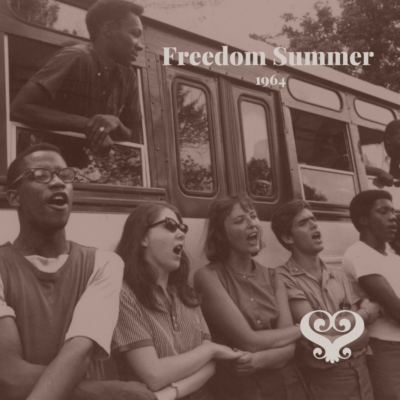On the side of an old country road in Neshoba County, Mississippi stands a lonely stop sign. Pick-up trucks with confederate flags drive past the sign as a small group forms to listen to a local guide and living legend, Leroy Clemons. 60 years ago, just beyond this location, an unspeakable act of terror would occur taking the lives of organizers, James Earl Chaney, Andrew Goodman, and Michael Schwerner.
The three men were a part of Freedom Summer, or the Mississippi Summer Project, a 1964 voter registration drive aimed at increasing the number of registered Black voters in Mississippi. Freedom Summer volunteers were met with violence from the KKK and local law enforcement. News coverage of beatings, false arrests, and murder drew international attention to the civil rights movement. That summer the KKK targeted and burned the local Mt. Zion Baptist Church.
Schwerner had previously spent time working at Mt. Zion. He was absent that day because he had been in Ohio training volunteers. Upon his return, the three men visited the charred remains of Mt. Zion. On the drive back to Meridian, their station wagon was stopped. The police arrested the three young men, holding them at the local jail for hours while the Klan made preparations. They were released and ordered to leave town immediately. They were never seen alive again.
Two days later, investigators found the station wagon, smoldering from an attempt to destroy evidence. The focus shifted from rescue to recovery of the men’s bodies. Throughout July 1964, investigators combed Mississippi. After six weeks of searching, a tip sent investigators to an earthen dam outside Philadelphia, MS. There the FBI uncovered the bodies of Schwerner, Chaney, and Goodman.
By the end of the summer in 1964, despite murder, assaults, and the burnings of dozens of churches in the state, Freedom Summer had created an impact. Volunteers registered more Black voters and initiated a challenge to the all-white Democratic Party that forever changed the national political landscape. Within two years, 100,000 new Black voters registered in the state and began running for elective office.

